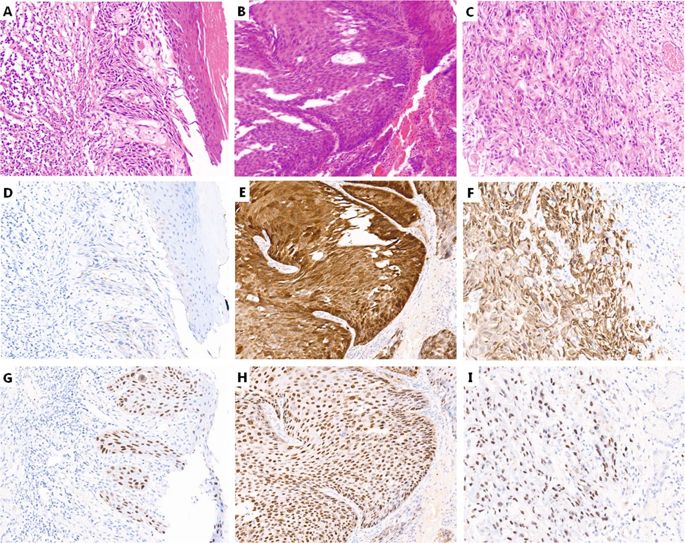当前位置:
X-MOL 学术
›
Modern Pathol.
›
论文详情
Our official English website, www.x-mol.net, welcomes your feedback! (Note: you will need to create a separate account there.)
CD274 (PD-L1), CDKN2A (p16), TP53, and EGFR immunohistochemical profile in primary, recurrent and metastatic vulvar cancer.
Modern Pathology ( IF 7.5 ) Pub Date : 2019-12-16 , DOI: 10.1038/s41379-019-0429-z Sofia Lérias 1, 2 , Susana Esteves 3 , Fernanda Silva 4 , Mário Cunha 5 , Daniela Cochicho 5 , Luís Martins 5 , Ana Félix 1, 4
Modern Pathology ( IF 7.5 ) Pub Date : 2019-12-16 , DOI: 10.1038/s41379-019-0429-z Sofia Lérias 1, 2 , Susana Esteves 3 , Fernanda Silva 4 , Mário Cunha 5 , Daniela Cochicho 5 , Luís Martins 5 , Ana Félix 1, 4
Affiliation

|
Vulvar squamous cell carcinoma can be divided by human papillomaviruses (HPV) status into two distinct clinicopathological and molecular entities. New agents targeting the tumor surface expression of programmed cell death-1/programmed cell death-ligand-1 are becoming a therapeutic option in an increasing number of carcinomas. We evaluate CD274 (PD-L1), CDKN2A (p16), tumor protein p53 (TP53), and epidermal growth factor receptor (EGFR) immunoexpression in primary tumors, recurrences and lymph node metastases and its correlations with prognosis and HPV status. We report 93 cases of vulvar squamous cell carcinoma diagnosed between 2002 and 2016 with the description of their clinicopathological features and prognosis data. Immunohistochemistry for CD274, CDKN2A, TP53, and EGFR was performed on tissue microarrays collecting from primary tumor, recurrences and lymph node metastasis. Kaplan-Meier estimator and multivariable Cox regression analysis controlling for FIGO stage and age were used. Patients who underwent surgery had a superior overall survival (HR = 0.51, 95% CI = 0.26-0.99 p = 0.04). Lymph node metastasis size ≥5 mm was associated with an inferior overall survival (HR = 1.88, 95% CI = 1.22-2.92 p = 0.004). CDKN2A expression was correlated with an inferior rate of recurrent disease (p = 0.02). In high-risk HPV DNA+ vulvar squamous cell carcinomas patients with CDKN2A- carcinomas showed a significantly worse overall survival than women with CDKN2A+ tumors (56% vs.100%, p = 0.003). TP53 expression was associated with an increased rate of recurrent disease (p = 0.0005). CD274 expression was associated with lymph node metastasis (p = 0.04). In 16 patients the CD274, CDKN2A, TP53, and EGFR expression changed between primary tumors, recurrences and lymph node metastases during tumor progression. In conclusion, a significant percentage of vulvar squamous cell carcinoma has a heterogeneous biomarker expression during tumor progression. We highlight the importance of some of these markers to be used as prognostic biomarkers. This data brings new light to future treatment using targeted therapy to EGFR or CD274 to include retesting such biomarkers in recurrence and lymph nodes metastases.
中文翻译:

原发性、复发性和转移性外阴癌中的 CD274 (PD-L1)、CDKN2A (p16)、TP53 和 EGFR 免疫组化特征。
外阴鳞状细胞癌可根据人乳头瘤病毒 (HPV) 状态分为两个不同的临床病理学和分子实体。针对程序性细胞死亡-1/程序性细胞死亡-配体-1 的肿瘤表面表达的新药物正在成为越来越多癌症的治疗选择。我们评估 CD274 (PD-L1)、CDKN2A (p16)、肿瘤蛋白 p53 (TP53) 和表皮生长因子受体 (EGFR) 在原发性肿瘤、复发和淋巴结转移中的免疫表达及其与预后和 HPV 状态的相关性。我们报告了 2002 年至 2016 年间确诊的 93 例外阴鳞状细胞癌,并描述了其临床病理特征和预后数据。对从原发性肿瘤收集的组织微阵列进行 CD274、CDKN2A、TP53 和 EGFR 的免疫组织化学,复发和淋巴结转移。使用 Kaplan-Meier 估计器和控制 FIGO 分期和年龄的多变量 Cox 回归分析。接受手术的患者总体生存率更高(HR = 0.51,95% CI = 0.26-0.99 p = 0.04)。淋巴结转移大小≥5 mm 与较差的总生存期相关(HR = 1.88,95% CI = 1.22-2.92 p = 0.004)。CDKN2A 表达与较低的疾病复发率相关 (p = 0.02)。在高危 HPV DNA+ 外阴鳞状细胞癌中,患有 CDKN2A- 癌的患者的总体生存率明显低于患有 CDKN2A+ 肿瘤的女性(56% 对 100%,p = 0.003)。TP53 表达与疾病复发率增加相关 (p = 0.0005)。CD274 表达与淋巴结转移相关 (p = 0.04)。在 16 名患者中,CD274、CDKN2A、TP53、在肿瘤进展过程中,EGFR 表达在原发肿瘤、复发和淋巴结转移之间发生变化。总之,相当大比例的外阴鳞状细胞癌在肿瘤进展过程中具有异质性生物标志物表达。我们强调其中一些标志物用作预后生物标志物的重要性。该数据为未来使用 EGFR 或 CD274 靶向治疗的治疗带来了新的亮点,包括在复发和淋巴结转移中重新测试此类生物标志物。
更新日期:2019-12-17
中文翻译:

原发性、复发性和转移性外阴癌中的 CD274 (PD-L1)、CDKN2A (p16)、TP53 和 EGFR 免疫组化特征。
外阴鳞状细胞癌可根据人乳头瘤病毒 (HPV) 状态分为两个不同的临床病理学和分子实体。针对程序性细胞死亡-1/程序性细胞死亡-配体-1 的肿瘤表面表达的新药物正在成为越来越多癌症的治疗选择。我们评估 CD274 (PD-L1)、CDKN2A (p16)、肿瘤蛋白 p53 (TP53) 和表皮生长因子受体 (EGFR) 在原发性肿瘤、复发和淋巴结转移中的免疫表达及其与预后和 HPV 状态的相关性。我们报告了 2002 年至 2016 年间确诊的 93 例外阴鳞状细胞癌,并描述了其临床病理特征和预后数据。对从原发性肿瘤收集的组织微阵列进行 CD274、CDKN2A、TP53 和 EGFR 的免疫组织化学,复发和淋巴结转移。使用 Kaplan-Meier 估计器和控制 FIGO 分期和年龄的多变量 Cox 回归分析。接受手术的患者总体生存率更高(HR = 0.51,95% CI = 0.26-0.99 p = 0.04)。淋巴结转移大小≥5 mm 与较差的总生存期相关(HR = 1.88,95% CI = 1.22-2.92 p = 0.004)。CDKN2A 表达与较低的疾病复发率相关 (p = 0.02)。在高危 HPV DNA+ 外阴鳞状细胞癌中,患有 CDKN2A- 癌的患者的总体生存率明显低于患有 CDKN2A+ 肿瘤的女性(56% 对 100%,p = 0.003)。TP53 表达与疾病复发率增加相关 (p = 0.0005)。CD274 表达与淋巴结转移相关 (p = 0.04)。在 16 名患者中,CD274、CDKN2A、TP53、在肿瘤进展过程中,EGFR 表达在原发肿瘤、复发和淋巴结转移之间发生变化。总之,相当大比例的外阴鳞状细胞癌在肿瘤进展过程中具有异质性生物标志物表达。我们强调其中一些标志物用作预后生物标志物的重要性。该数据为未来使用 EGFR 或 CD274 靶向治疗的治疗带来了新的亮点,包括在复发和淋巴结转移中重新测试此类生物标志物。



























 京公网安备 11010802027423号
京公网安备 11010802027423号